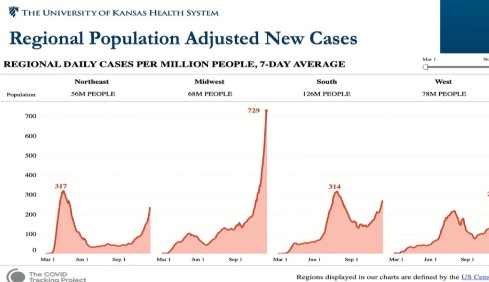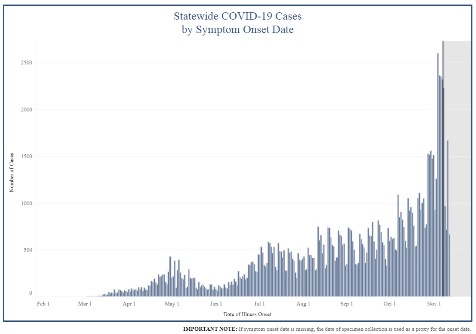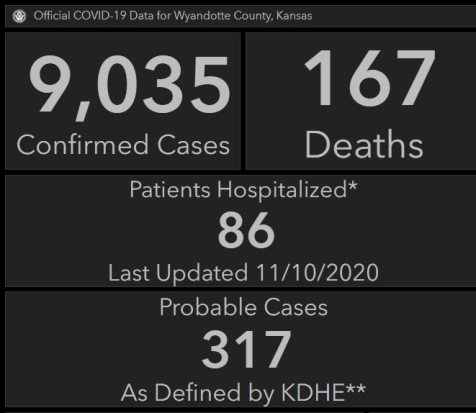The University of Kansas Health System now has started to limit surgeries because of the rise of COVID-19 cases.
Dr. Steve Stites, chief medical officer of the KU Health System, said at a news conference on Thursday morning that because hospital beds are starting to fill up with COVID-19 patients, the hospital is starting to defer some surgeries to a later date.
“As of today we started postponing cases,” he said.
They are asking departmental chairs to pick one or two surgery cases they felt could be postponed, that would not affect that person’s long-term health, he said. They believe they can reschedule them all, and they hope to reschedule them within two weeks, depending on the COVID-19 crisis itself, he added.
“We are deferring cases as of today, because of the lack of beds, because of the overwhelming numbers of COVID patients,” he said.
They are fortunate that they are able to staff all of their beds at KU hospital, he said, which some other places aren’t able to do. They also are concerned about increasing numbers of their staff who are out with COVID-19 cases from community acquisition.
He said the problem is there’s uncontrolled spread in the community for COVID right now, and the rapid increase is going to affect everyone, and is going to affect hospital bed capacity, he said.
In the past week, the KU Health System’s number of inpatients with COVID-19 has risen greatly. It was in the 30s some weeks ago and the total number was 114 on Wednesday. The numbers decreased on Thursday, to a total of 93.
On Thursday morning, the total number of COVID-19 patients at KU Health System in Kansas City, Kansas, was 93. There were 67 active COVID-19 patients, with 20 in the intensive care unit and 12 on ventilators, according to Dr. Dana Hawkinson, medical director of infection prevention and control. Twenty-six hospital inpatients with COVID-19 were in the recovery period, with three of those on ventilators. The total number was down from 114 on Wednesday.
COVID-19 cases in the nine-county Greater Kansas City area increased by 855 cases on Wednesday, according to the Mid-America Regional Council’s regional COVID-19 hub.
At the news conference Thursday morning, Dr. Allen Greiner, chief medical officer for Wyandotte County at the Unified Government Health Department, said most of the public health officials feel like making some changes now with rising case counts in the community and hospital capacity issues.
The changes would not be full lockdowns, Dr. Greiner said. Instead, they will be looking at changes in gathering sizes and restricting groups that they think are causing a rise in the COVID-19 rates.
Currently, Wyandotte County has a limit on gathering sizes of 45 people.
Dr. Greiner said he was on a call earlier Thursday with the Kansas City, Missouri, public health officer who is considering a list of recommendations. He said they would like to be part of that effort.
The surrounding communities have some different size limits on gatherings, and they may see some movement on reducing those numbers in the coming days, he said, perhaps to 10 or 25 or smaller.
They also may be looking at enforcement and more education, he said.
When the economy was shut down in the spring, they didn’t know the effectiveness of masks at that time, but now, they know that mask-wearing works, Dr. Greiner said. It’s not necessary to shut down the economy, but it may be necessary to make some smaller changes, including efforts to encourage more mask-wearing.
Wichita recently has limited the size of mass gatherings, according to the doctors.
Dr. Greiner said it’s possible that 2 to 3 percent of the Greater Kansas City community has COVID-19 and is potentially infectious. Ten to 12 percent of the population of Wyandotte County might have had COVID-19 in the last eight months, he said.
That’s why the idea of herd immunity by intentionally getting COVID-19 is not a good idea, he said. Hospitals are almost at capacity and herd immunity would require 70 to 80 percent of the population to get it. Any effort toward herd immunity would overwhelm hospitals and many people would not be able to get proper care.
Dr. Greiner said people need to change their behavior now, and then vaccines and therapeutics will be coming.
Dr. Hawkinson said they have seen some reinfections of COVID-19 within 60 days, which is another reason not to try to get it intentionally.
A Johnson County public health doctor said that they have fallen behind on contact tracing, and now are contacting COVID-19 patients and asking them to notify their contacts. They are still working on contact tracing, however.
Dr. Stites said the KU Health System in Kansas City, Kansas, has had to turn down transfers from other hospitals because of bed capacity.
When the pandemic started in April, they had to turn down about 40 cases from other areas, he said. In October, they turned down about 140 transfers.
Dr. Stites said capacity issues are a problem not just for COVID-19 patients, but also for anyone who has a heart attack or a stroke and can’t get transferred from a small, rural hospital.
The KU doctors’ news conference is online at https://www.facebook.com/kuhospital/videos/279494163450130.
The UG COVID-19 webpage is at https://alpha.wycokck.org/Coronavirus-COVID-19-Information.



